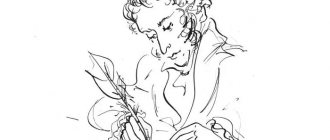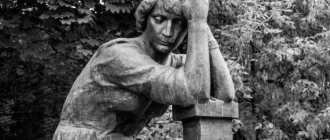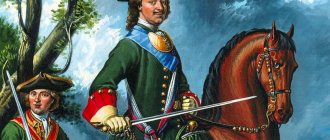The image of Peter I in the works of A.S. Pushkin in the second half of the 1820s
Pushkin considers the path of achieving high ideals that the Decembrists followed to be disastrous and doomed. His friends, ardent romantics of freedom, did not take into account the real power of autocracy, based on the people's faith, on a thousand-year historical tradition. Pushkin is increasingly inclined to think that social changes in Russia are possible only by relying on this powerful state system, capable of leading the country along the path of decisive transformations. The historical figure of the great reformer Peter I clearly demonstrated this.
The theme of Peter - on the one hand, the transformer of Russia, the creator of a new and powerful Russian statehood, and on the other, an autocratic despot - has long attracted the attention of Pushkin, was first reflected in his “Historical Notes” of 1822 and was further developed in the unfinished novel “ Moor of Peter the Great" (1826-1827). In "Poltava" she appeared as the apotheosis of Peter's work, the triumph of Russia transformed by him over its eternal enemy Sweden and King Charles XII - one of the most famous commanders of the early 18th century, before whom all of Europe was in awe. The situation is in many ways similar to the one that arose as a result of the victorious end of the War of 1812 for Russia, and in Pushkin’s depiction it is undoubtedly oriented towards it.
“The Bronze Horseman” is a national historical poem, but its action is confined to modern times and takes place in St. Petersburg during the alarming days of the terrible November flood in 1824.
Petersburg of the Bronze Horseman is not only a realistically depicted place of the narrative action associated with the flood and not only the capital of the Russian statehood created by Peter, but also the figurative and symbolic focus of its historical destinies, which are still problematic in many ways.
The image of the Bronze Horseman is as meaningful as the image of St. Petersburg. But beyond that, it is frankly fantastic, since in the end it turns the monument of Peter into an active figure, enraged by Eugene’s rebellion and pursuing him all night with his “heavy, sonorous galloping.” Science fiction has a psychological, and thereby realistic motivation, being the fruit of Eugene’s sick imagination. Like any realistic motivated fiction, it has a symbolic, not completely logically definable meaning, suggested, however, by the symbolism of the Falconet monument to Peter itself. Its composition embodies the traditional for the art of the era of absolutism, but already known to the art of the Renaissance, likening the rider to a sovereign ruler, and his horse to a subject to the state or people
In Pushkin’s poem, the likening acquires a new, unconventional meaning due to its duality - apologetic, but far from completely applied to the rider, and hinting at the problematic nature of the future destinies of the horse spurred by him and rapidly rushing:
Where will you gallop, proud horse, and where will you land your hooves?
This question, to which the poem does not answer, is its problematic epicenter. To whom is the question addressed? Essentially - to the Russian people and state, textually to the Horse, “raised on its hind legs” by the Bronze Horseman - the symbolic double of Peter. In the confused and hostile perception of “poor” Eugene, the Bronze Horseman is a “proud idol”; in him he recognizes the one who, in the menacing hours of the flood, invariably and
... stood motionless in the darkness with a copper head, the One by whose fatal will the city was founded under the sea... He is terrible in the surrounding darkness!
Terrible, but at the same time majestic and mysterious:
What a thought on the brow! What power is hidden in it! And what fire there is in this horse! Where will you gallop, proud horse, and where will you land your hooves? O mighty lord of fate! Isn’t it true that you raised Russia on its hind legs above the very abyss? At the height of an iron bridle?
(5, 147)
But these are the impressions and thoughts no longer of the hero of the poem, but of its author. “Iron bridle”, “Raised on hind legs”, and even “over the very abyss” - far from characterizing Peter’s work from the best side. In the Introduction to the poem, Peter and his work appear in a completely different light. The introduction is written in the form of an excitedly lyrical monologue by the author, admiring the beauty and grandeur of the front facade of St. Petersburg - the “military capital” of the Russian Empire created by Peter.
The lyrical part of the Introduction ends with an apotheosis of Peter and his cause, the inviolability of which is the guarantee of the national dignity and greatness (“independence”) of the Russia he renewed:
Show off, city of Petrov, and stand unshakable, like Russia,
May the defeated element make peace with you; Let the Finnish waves forget their enmity and their ancient captivity, And let not vain malice disturb Peter’s eternal sleep!
(5, 137)
The following “sad story” about the “terrible time” of the St. Petersburg flood is a plot-figurative concretization of the “vain malice” of the raging elements of the “Finnish waves”, hostile to Peter and defeated by Peter (Petersburg). What does this element mean? Is it just a blind and formidable natural force or something more and implied? If only the first, then how and in what sense is she defeated and captured by Peter? After all, the whole “sad story” about the “terrible time” of its destructive action indicates the opposite. In addition (and most importantly): if the flood, with which the plot frame of the narrative is inextricably linked, does not mean anything other than itself, then “The Bronze Horseman” turns out to be not a national historical poem, but something similar to the St. Petersburg stories of the “natural school”. It should be noted that Pushkin’s poem anticipates many elements of the poetics of the “natural school” - the principles of a sympathetic portrayal of the “little man” and a sharp exposure of the social contrasts of St. Petersburg reality, the victim of which is the “little man,” mostly a petty official. But Evgeny of the Bronze Horseman is a “little man” and a special kind of official. He is the same as the author, “a fragment of decrepit genera, And unfortunately, not alone” (“My Pedigree”), but unlike the author, he forgot about his family prerogatives and turned, like many like him, into a real “philistine ", an ordinary and humble Russian citizen of the era of the Nicholas reaction. This is evidenced by Evgeniy’s “bright dreams” of rising to the rank of “shtetl” and finding a quiet family haven by legally marrying Parasha, who is as poor as himself and whom he loves. We know nothing about Parasha, except that she is poor and lives with her widowed mother in a “dilapidated house” on the outskirts of St. Petersburg. But we know that the economic, political, and spiritual degradation of the nobility was, according to Pushkin, a direct and fatal consequence of Peter’s reforms, which deprived the Russia they had renewed of social strength that could limit autocratic tyranny and lead further national progress. It seems that it is precisely this contradiction of Peter’s reforms, undoubted for Pushkin, that forms the problematic core of the symbolic pairing of the plot-figurative fabric of Pushkin’s St. Petersburg poem with the whole complex of problems of the present, past and future of Russia that worried him. The “philistine”, philistine humility that characterizes Eugene at the beginning of the poem, during the days of the flood turns into his defenselessness. Before what? In the direct, “natural” sense of the story - before the raging elements of the “Finnish waves”. But their destructive element is terrible not only for the small people of St. Petersburg, to which Eugene and his beloved belong, but also for the “new capital” of the Russian statehood transformed by Peter, Petersburg itself, which “by the will of fate” of the same Peter was founded “under the sea.”
Peter’s “will”, the inconsistency of his actions, is the point of symbolic conjugation of all the plot-figurative components of the story about the poor St. Petersburg official, both natural and fantastic, with the historical, largely mysterious destinies of post-Petrine Russia.
In this regard, attention should be paid to the fact that is usually not taken into account that the expressive depiction of the flood is designed in the style traditional for Russian literature of the first third of the 19th century, including for the work of Pushkin, the metaphorical likening of historical upheavals - rebellion, rebellion, foreign invasion - “thunderstorm”, “storm”, “sea waves” or simply “waves”. True, in “The Bronze Horseman” the opposite seems to take place - the likening of a raging natural disaster to a formidable historical shock. But this does not change the essence of the matter, because the associative connection between the direct and figurative meaning of likening remains the same. And you cannot neglect it. Among other things, it also clarifies the implied semantics of the “hostility” towards Peter mentioned in the Introduction to the poem, the “vain malice” of the “Finnish waves” captured by him. Finnish means foreign, which makes us recall the following lines of Pushkin’s poem “The Borodino Anniversary” (1831):
Is Rus' strong? War, and pestilence, and rebellion, and the pressure of external storms, raging, shook her - Look: she’s still standing! And all around her the worries fell...
(3, 275)
The attitude of A. S. Pushkin to Peter the Great
Alexander Sergeevich Pushkin often refers to Peter the Great in his works. In the works “Poltava” and “The Bronze Horseman” the image of the Russian emperor is the main one. But the writer’s attitude towards politics is completely ambiguous; Pushkin views Peter from two completely different sides: from the state side and from the humanistic side.
In many lines of his works, Pushkin solemnly praises Peter I.
The writer glorifies the emperor for his military merits:
“Peter is feasting. Both proud and clear
And his gaze is full of glory.
And his royal feast is wonderful.
At the shouts of his troops...”
Indeed, the merits of Peter I are very great: during his government, Russia won many difficult wars. Pushkin also admires St. Petersburg: “I love you, Peter’s creation...”. This city was built in a difficult place, almost on a swamp. But nevertheless, it is great and beautiful to this day. The writer characterizes Peter as a brave and decisive ruler.
But Pushkin’s attitude towards Peter the Great is not limited to this. The writer reveals another side of the emperor in the poem “The Bronze Horseman”. Are you enrolling in 2021? Our team will help you save your time and nerves: we will select directions and universities (according to your preferences and expert recommendations); we will fill out applications (all you have to do is sign); we will submit applications to Russian universities (online, by e-mail, by courier); we will monitor competition lists ( we will automate the tracking and analysis of your positions); we will tell you when and where to submit the original (we will evaluate the chances and determine the best option). Entrust the routine to professionals - more details.
In it, the population of St. Petersburg is faced with disaster: flooding. It would seem that the only culprit is nature. But Peter I once decided to tame her. And she broke free, like an animal sitting in a cage. As a result, innocent people suffered. Did Peter know that this would happen? Probably yes. But the emperor believed that he was, as Pushkin calls him, “the master of fate,” that he had the right to sacrifice people for the good of the state.
The figure of Peter I is ambiguous in the history of our Fatherland. Alexander Sergeevich Pushkin is trying to convey to the reader that this emperor has not only brilliant merits, but also enormous guilt before those whom he destroyed in the pursuit of the greatness of Russia.
Useful material on the topic:
- The early period of Pushkin's biography. The making of a poet. The significance of Pushkin for Russian culture and literature
- Biography of Pushkin. The duel and death of Pushkin
- Biography of Pushkin. Responses to Pushkin's death
- Pushkin's duel. Pushkin's last hours
- Works of A.S. Pushkin. The cultural significance of ethics and morality in the works of A.S. Pushkin, as the main meaning of the novel “Eugene Onegin”. Examples from the novel “Eugene Onegin”



